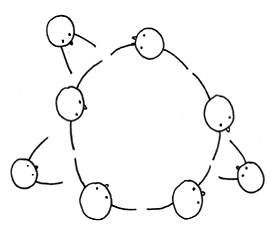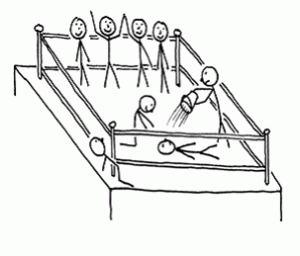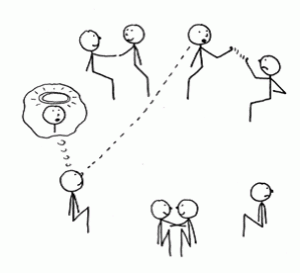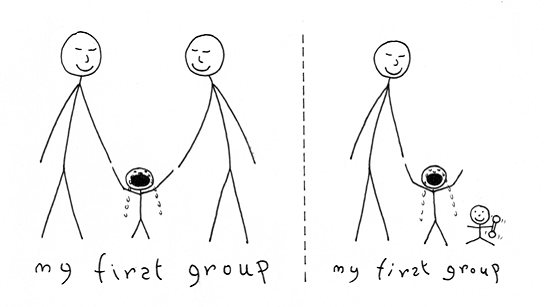Maggie Kindred and Michael Kindred are authors of Once Upon a Group: A Guide to Running and Participating in Successful Groups , new in paperback from JKP.
We are in groups throughout life. Many different kinds of groups occur in social clubs, health and social care, industry, commerce, education, politics, churches, and voluntary organizations. People of all ages are involved, including small children. Most of them have no idea they are involved in ‘group processes’! Groups are natural, and usually get by without analyzing themselves. So why bother to spend time in training?
The basic working group is ‘the meeting’. Remember that this could include a group of friends planning an outing, just as much as a staff meeting. Is it your experience that meetings are sometimes seen as necessary evils, things to be got through, even to be dreaded? This is a shame as they are so important in shaping everything from world events to leisure and community organizations, where people give hours and hours of their time and endure much heartache in order to organize something. At best they are often not as productive or efficient as they could be. On the other hand, ‘groupwork’ is thought of as something engaged in by professionals in the helping professions, and is surrounded by considerable mystique.
We have written this book because we believe that using a group isn’t mystical, but can be considerably more enjoyable and effective if members know a little about how groups function:
- Working in a group can be a more efficient, time-economic, and enjoyable way of working than one to one.
- Groups can bring together as much knowledge and skill as there are people in them. A group is more than the sum of its parts!
- If people have something in common, they can benefit from the contributions of their peers. This is the principle behind support groups for people with a particular condition, or who are carers, for example
- Groups are especially good for obtaining information from children and/or people with low levels of literacy.
- Groups have more fun! Of course this is not always true, but the creativity, helping each other along, and humour which happens in a well-functioning group may leave individual work far behind if the group members can see a common purpose.
We believe that, although numbers, purposes, how well people know each other and the length of time they are together change things slightly, there is a sequence of natural evolution of group life, be it one meeting or several. The point of training is to enhance this process by cooperating with it.
We have found the ideas of W. Schutz*, absolutely illuminating:

Schutz believed that we begin any group, whether or not we are the leader or one of the led, being concerned with thoughts and feelings about membership, belonging, acceptance, commitment, and physical and emotional comfort – what he termed Inclusion. In the case of people who apparently know each other well, as in a work team, these points are often taken for granted – they shouldn’t be! In meetings, they are usually nominally attended to by the introductions process – this is not enough. People need to be comfortable, be able to see everyone, and be quite clear what the meeting is about.
‘Who is in charge?’ Control is a central issue in meetings. People often look to the chairperson to ensure order, and become frustrated if they perceive the chairperson to be weak. But there is much more to it than the personality or technique of the leader: According to Schutz, during the life of a group there will be many bids for control, and these are often, but not always, directed at the person who has been designated as leader. The bids begin early on in the group life, and often take the form of challenging questions, ‘Just a minute …’ type comments, and sometimes outright diversions from the task. Leadership bids are sometimes quite conscious challenges, but just as often are expressions of need for attention, or simply creativity which has surfaced spontaneously, perhaps at the wrong time. Whatever the nature of the leadership or control bid, the group, not just the leader, needs to deal with it; not to do so can allow it to render the group both unsatisfying and ineffective.

If the leadership bid is definitely hostile or rude, it is important that group members do not passively sit back and leave the chairperson to handle things, particularly if challengers are racist, sexist or discriminatory in their utterances. Whole group action is far more effective than a dialogue between the challenger and the chairperson, which is negatively satisfying for the former, and dreaded by the latter.
Resolving the control issues satisfactorily is vital to the next stage – Affection.
‘Affection’, according to the Schutz model, describes the creative bonds which form between members, rather than whether people like each other or not. These bonds help the group to enter its most productive stage, and make it effective and enjoyable. This is when things get done, decisions made, plans evolved. The chairperson needs only to place light touches on the reins, keep things on track and watch the timekeeping. As in all groups, it is to be hoped that there will be contributions from all members.

During the ending phase, the bonds of Affection loosen first and are gradually dissolved. Members begin to be preoccupied with people and concerns outside the group. There are feelings associated with other endings: loss, achievements, regrets – these can be stronger than you might think. For this reason time and attention needs to be devoted to this phase of group life. There are often formal ways of ending, such as allocating jobs. Giving individual thanks to each member, with a mention of their particular contribution, is very important.
Of course real life is not as tidy as the above, and there is much more to be said – this is just a taster to whet your appetite!
Copyright © Jessica Kingsley Publishers 2010.
